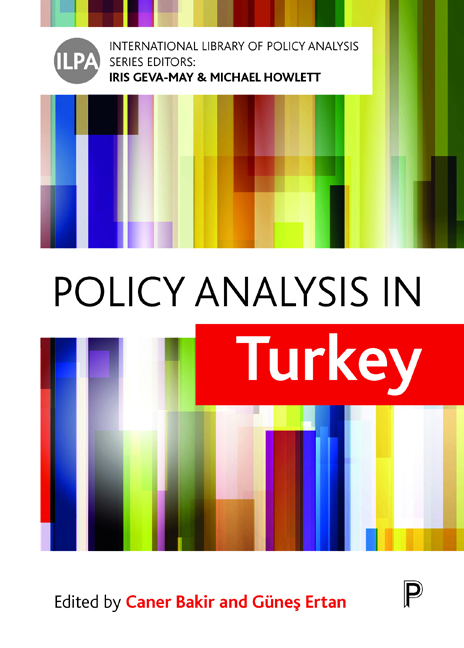Book contents
- Frontmatter
- Contents
- List of tables and figures
- Notes on contributors
- Editors’ introduction to the series
- one Pushing the pendulum from politics to policy: the state of policy analysis in Turkey
- Part One Historical roots, styles and methods of policy analysis in Turkey
- Part Two Policy analysis by governments
- Part Three Experts, international actors and public opinion
- Part Four Parties and civil society-based policy analysis
- Part Five Academic, bureaucratic and advocacy-based policy analysis
- Index
five - Policy analysis in Turkey’s central government: current practices and future challenges
Published online by Cambridge University Press: 19 April 2022
- Frontmatter
- Contents
- List of tables and figures
- Notes on contributors
- Editors’ introduction to the series
- one Pushing the pendulum from politics to policy: the state of policy analysis in Turkey
- Part One Historical roots, styles and methods of policy analysis in Turkey
- Part Two Policy analysis by governments
- Part Three Experts, international actors and public opinion
- Part Four Parties and civil society-based policy analysis
- Part Five Academic, bureaucratic and advocacy-based policy analysis
- Index
Summary
Introduction
This chapter focuses on recent developments and institutional transformations in the Turkish central government's administrative system, and analyses prominent policy-making actors.
A detailed discussion of current practices and future challenges in policy analysis in Turkey's central government would be incomplete, however, without a brief historical overview.
During the founding of the Republic in Turkey, a modern politicaladministrative system was shaped based on a unitary state and parliamentary political regime, with the Assembly and the ‘parliamentary government’ system playing a dominant role. The 1924 Constitution, from which the current constitutional regime originates, instituted a classical parliamentary regime, and the President of the Republic and Council of Ministers were defined as the executive bodies of the political-administrative system (Eroğul, 2000, p 257), with principal executive powers. Turkey adopted a multi-party system in 1950 and a new constitution in 1961 (Sabuncu, 2002, p 31).
In the 1950s, the Democratic Party had tried to reduce the privileges of the bureaucratic class, to remove bureaucratic channels, to reduce the economic status of the bureaucracy, to limit the state's intervention in the social structure and to strengthen the private sector (Berkman and Heper, 2002, p 151). In this period, the international organisations’ technical assistance to the developing countries affected the public administration. During the last years of the 1940s and the 1950s, reports of foreign experts and commissions – (Neumark, Conk and Savun, Barker Mission, Martin and Cush, Leimgruber, UN Working Group, Chaileux Dantel) (see Yayman, 2016, pp136-156) – made to the Turkish public administration focused on organizational structure, managerial processes and personnel management. However, the application was limited and priority was given to depoliticization in order to make the bureaucracy efficient and effective (Berkman and Heper, 2002, pp 152-154).
Although the 1961 Constitution did not amend the governmental and central executive organs in general terms, it added some major players such as the Constitutional Court, State Planning Organisation (SPO) and State Personnel Department (SPD) to the policy-making process (Heper, 1994, pp 667-8; Polatoğlu, 2000, pp 89-90). Initiated in the 1950s following reports by foreign experts, discussions on the re-organization of Turkey's public administration yielded some results at the project and report levels in the 1960s due to studies by the Public Administration Institute for Turkey and the Middle East (TODA İ E), the Ministry of Internal Affairs and SPO (Berkman and Heper, 2002, pp 154-6; see Tanor, 1995).
- Type
- Chapter
- Information
- Policy Analysis in Turkey , pp. 69 - 86Publisher: Bristol University PressPrint publication year: 2018



